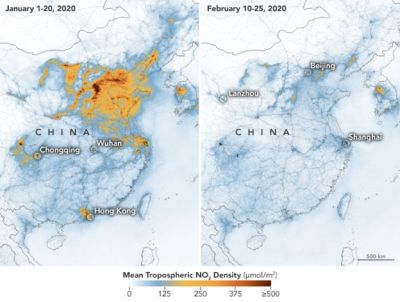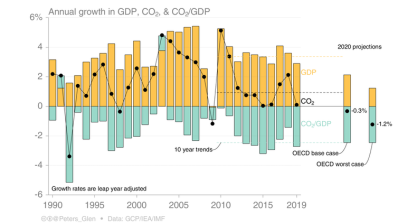The novel coronavirus sweeping the globe has led governments to institute widespread quarantines to stem the spread. Many industries have slowed production or shutdown entirely, and economic activity has slowed to a crawl. This has naturally led to a sudden reduction in greenhouse gas emissions. But how great will the effect be, and will it buy us any real time?
On The Ground

In the wake of COVID-19, good news stories have sprung up as people look for a silver lining. Unfortunately, these stories aren’t always true. There aren’t dolphins in the waters of Venice, though the water has cleared due to reduced boat activity. And drunken elephants did not begin roaming the mountains of China.
Despite this, there have been notable reductions in emissions in several areas due to government-mandated lockdowns. Northern Italy is seeing a much lower concentration of nitrogen dioxide, likely due to reduced industrial and vehicular activity. Carbon monoxide levels have similarly dropped in New York, while China has seen its carbon emissions temporarily drop by a full 25%.
On the surface of it, these are all promising numbers. Many are cautiously optimistic that this could be a major development to help stave off the worst of climate change for a little longer. Nonetheless, it’s early days yet, and what happens after the crisis passes is just as important as what’s happening now.
Similar Situations – Similar Results

The most relevant comparison with the current situation would be the 2007/2008 Global Financial Crisis. Due to reduced economic activity, the world’s total Gross Domestic Product contracted by 0.1%, and emissions output dropped by 1.3%. Following years led to a rapid increase as economic activity picked up, with 2010 reaching an all time high.
While the current situation is fluid and changing rapidly, OECD worst-case predictions are that the global economy will continue to grow, albeit at a reduced rate of just 1.5 this year. This is due to widespread job losses, and the slowdown and shutdown of many industries. Modelling based on this data from Glen Peters suggests that this could lead to an emissions reduction of up to 1.2%.

There’s scope for these numbers to change drastically in the coming months. Unease in global markets could lead to further issues with liquidity, or a resurgence of the virus could extend lockdowns, keeping industries closed for a longer period of time. Alternative modelling may show that the reductions in air transport and vehicle use may have a larger effect than first anticipated. At the same time, the crisis may also hold up work on projects that aim to reduce emissions, negating expected gains in carbon efficiency going forward. As it stands, the best guess we have shows a significant, but small, reduction in emissions this year.
Is It Enough?
In 2018, the UN warned that we had just 12 years left to put a stop to the worst effects of climate change. At the time, the goal was to reduce carbon pollution by 45% by 2030, dropping down to net zero by 2050. Given that sweeping lockdowns of entire cities at a time, along with massive reductions in all international air travel, is only netting us 1.2%, it’s clear that a worldwide epidemic is not the silver bullet that will solve climate change once and for all.
The goals put in place by the UN may seem lofty, particularly when even a global pandemic barely makes a dent. Notwithstanding, they are achievable with the technology we have available. The only requirement is we invest $300 billion to achieve it. In a time of turmoil, with unemployment spiraling ever higher and a new disease threatening the health of the world, this may seem like an impossible sum. However, given the recent expenditures governments have made in the name of economic stimulus, well into the trillions of dollars, it’s unlikely the citizens of the world will continue to accept affordability as an excuse.
















The pandemic is indeed far from a silver bullet.
If governments the world over put their money on not just stimulating the economy, but by stuffing money into environmentally sustainable projects and the like, then it could likely be a decent step forward.
Remember Solyndra? US government sunk huge amounts of money into it. It was a colossal failure.
Because the US government invested in one fraudulent green tech solar panel startup that eventually failed doesn’t mean that any and all investments in this field ever will result in bankruptcies or fraud…
This is but one result of California’s Green Energy experiment, over 6000 birds are fried every year! I drive by the Ivanpah Solar Plant at least once or twice a year and most of the time the main solar boiler is offline. BTW, NRG the main contractor for maintaining this unit has decided it was not economically feasible to run this plant. The unit shut down last year and California Tax Payers like myself have been paying a “green tax” to subsidize this failure. See the links below;
https://www.latimes.com/local/california/la-me-solar-bird-deaths-20160831-snap-story.html
https://www.greentechmedia.com/articles/read/americas-concentrated-solar-power-companies-have-all-but-disappeared
Perhaps the point is that the US Government does not have the best track record with such things.
In a lot of states they made it illegal to get off grid. You can get solar, often are even subsidized for it, but you have to hook it to the grid and pay for electricity. You get credit for whatever you produce, but if they’d just allow individuals to go off grid, I’m sure we could make it economical. Maybe not for big factories, but likely easily for family homes or a neighborhood.
Not to mention that one generally shouldn’t place all one’s eggs in one basket.
And there is far more countries in the world than the US.
Now it is generally easier to get publicity from saying, “we invested X billion dollars in this project!”
Than saying, “We spend X billion dollars on this list of thousands of smaller projects.”
The later is though a far safer investment, since it is highly unlikely that all those projects fail.
Though, the return on the investment might not be as brilliant either. But at least we don’t pour money down the drain.
And when it comes to stimulating the economy during a rescission, it can be better to invest in many smaller things than one big one. Since when the big one is done, one might just risk another recession since people/companies have little to do again….
“Given that sweeping lockdowns of entire cities at a time, along with massive reductions in all international air travel, is only netting us 1.2%, it’s clear that a worldwide epidemic is not the silver bullet that will solve climate change once and for all.”
Nor should it be, BUT and an important one is that it shows change can have an effect, especially important in any future climate change debate.
I also see this whole pandemic changing a lot of assumptions, and the way we currently do things.
From the few people that I know who are still traveling by air. The planes are almost empty. (10 people in a 737). That means that the emissions reduction is not nearly down to the level of passenger reduction.
I agree it will change assumption. If in the final analysis this was worth while, assumptions will tend one way. If not, assumptions about government power and advice will go another direction. Time will tell.
Other than a short pause in humanity’s inexorable path towards messy and non-sustainable economics, nothing will change. Humans, as a species or as a society, have no realistic sense of causality. Few humans understand stuff, and even fewer humans care to understand stuff.
We will back on the same messy track in 10 to 14 months.
Yes, that vast majority of people have a hard time seeing the bigger picture.
And a lot of people also hide behind, “but I am only one person.” Instead of aiming at making a difference regardless.
Though, there is also people who makes decisions to try to improve their environmental impact, but it can be exceptionally hard for the average Joe to actually know what is and isn’t helpful.
Not to mention that a lot of people aim at compensating, not reducing. A similar example would be people who try to eat more healthily by adding a salad on top of their already existing meal.
We have unsustainable consumption.
Renewables increase efficiency.
Efficiency reduces cost.
Low cost increases demand.
Increased demand increases consumption.
We have unsustainable consumption.
reopen all the things and tell people they are fine, allow body count to rise, consumption reduced.
Your second sentence is where your track fails. Many renewables are far less efficient. Just look at electric cars. They run on mostly fossil fuel – produced electricity and environment-destroying battery materials. Plus, huge windmills are made of man-made blade materials that are useless after a few years and turn into difficult-to-handle waste. That is far from efficient.
I’ve heard the unsustainable consumption thing before. In the 70s, ‘experts’ predicted that the world could not sustain populations that were half what we have now (look up ‘late, great planet earth). They were all wrong.
It depends how “sustain” is defined. If it means we can exist then obviously it was wrong. If it means over long periods of time then I’d argue it’s right: we can’t keep living for another 200 years the way we have lately with as many of us. Just not possible. We’re exhausting resources faster than they can renew.
Reported by mistake, sorry.
You missed the report saying that electric cars reduce carbon emissions even using polluting energy. It was in all the news a while back
The world can’t sustain the amount of natural resource destruction we are currently doing. It’s just a matter of time before we run out of things.
> The only requirement is we invest $300 billion to achieve it. In a time of turmoil, with unemployment spiraling ever higher and a new disease threatening the health of the world, this may seem like an impossible sum.
Unemployment is not a problem, because the people who have those money don’t work anyways.
$300 billion is pocket change (ISS cost ~ $150 billion, annual military expenditure $1800 billion, …)
Stop making stuff up and look up actual military spending. You are WAY off.
Stop making assumptions.
The previous post did not say US military spending, just military spending.
This is a world problem, not a US problem, and world military spending (depending on how you measure it), is of the order of 1.8 trillion USD, so the stated figure is at least of the correct order of magnitude, and I would say the point is valid.
If we spent more on remedying the effects of our collective environmental destruction, that would not necessarily have to come at the expense of military spending, however there is equally no reason to suggest that military budgets are in any way sacrosanct.
$1800 bil might be an exaggeration, but I googled it and it’s in the ballpark of $934 billion. Still much more, but this is every year.
This may have started as a ‘look for something good in the midst of something bad’ piece, but veered into ‘let’s stir up controversy’.
One of the best and most reliable ways to sabotage any project is to start piling on additional requirements.. call it scope creep, gold plating, straws breaking the camel’s back, or whatever you want. It’s a temptation experienced developers know all too well, and which successful developers learn to fight.
The project right now is to avoid mass death. There are a lot of worthy side-projects associated with that, like rapid creation of PPE for medics, and research into building field-expedient ventilators for people whose biggest problem is getting one more breath. It’s easy to trace a mental path from those to the goal of helping keep people alive.
I can’t think of any way that another flamewar about climate will help even one person currently infected, or trying to figure out how to pay their expenses with the economy in suspended animation.
Let’s see if we can politely agree to defer this conversation until we’ve dealt with issues that have major consequences over a shorter timespan, shall we?
So you don’t see the connection between protecting our environment and protecting our lives?
You’re an absolute moron if you can’t see the obvious distinction between severe societal impacts over the next 18 months, vs. the debatable societal impacts 100 years from now. 🤔
Are they similar? Yes. Opposite ends of the urgency spectrum? Absolutely.
This is *not even remotely relevant* right now. F*ck the climate of 100-1000 years from now. Society has more immediate concerns. 😪
The problem is that the politicians know average Joe will think this way and they tend to push through all the stuff their donors lobby for that would normally get pushed back.
The effects of climate change are happening now, and some of the most severe effects will be felt within our lifetimes. This isn’t something 1000 years from affecting us. This is something affecting us now.
You might have noticed that people are individually still using quite a lot of energy. I’ve been watching the statistics for my country’s electricity grid and the power demands are essentially the same as always. That’s a lot of Netflix considering most industry is shut down.
“a much concentration”?
Ah so you think the CO2 rise is not due to man made activities? It would still rise as much if we all went into hibernation? I can’t think of a single scientific theory that would support the level of CO2 rise as a natural phenomenon. Well lets think about it a bit. Maybe there is a transport lag to testing sites. Widespread economic shutdown didn’t really occur outside China until early March. It’s early April now. Maybe the economy could use a little shut down time so we can gain perspective. Less consumerism could easily be tolerated once we are weaned off it.
Oh, please! CO2 has risen much higher than now in the distant past. Theory does not support the level of CO2 rise as a natural phenomenon. DATA does. “Less consumerism?” Start with yourself.
There is no credible alternative explanation for the current CO2 rise. And it may come as a surprise to you that we can actually calculate the amount of CO2 we are adding from the known fossil fuel consumption rate. I have been practicing less consumerism for quite a while. My cars are 15 year old. My shoes are 1 year old. I don’t buy shit just to be buying. So what DATA supports the CO2 rise as a natural phenomenon.
What amount of global cooling would the models predict the currently lowered emissions would create?
“What amount of global cooling would the models predict the currently lowered emissions would create?”
What makes you think that a couple of months worth of lower emissions will have any effect on a problem that has been building since the start of the industrial revolution, far less a “cooling” effect.
The lowered emissions in places like Delhi however are having a very marked and immediate effect on air quality.
It would be an interesting if somewhat macabre study to see if fewer people will die as a result of COVID19 in Delhi and elsewhere than would have died from respiratory diseases caused by business as usual pollution over the same period.
Far greater improvements have been accidentally made with respect to air and water quality, in a few weeks, than have been made over may years of political infighting and pontification about environmental matters in Delhi and elsewhere. The law of unintended consequences has played in our favor for once.
What in the name of hackery does this article have to do with ANY type of hacking? This doesn’t seem like the type of forum to push something so off-topic and political, especially at this completely inappropriate time.
And for those who are essentially saying, “Good, leave the economy down. That’ll teach us a lesson”, I have a question for you. Who puts food on your table?
Clearly not you!
This is an incredibly incendiary, naive, and pathetic attitude toward the suffering of your fellow mankind.
Just a moment, I’ll put an Arduino and a 555 in the article for you.
Oh man, I spit my orange juice all over the keyboard with that comment! That was just damn funny, and with all that is going on, I sure needed a laugh. Not meaning this to be a poke at Dex, but dude, that Arduino comment was golden!
@lewinDay, i think you’re missing a word in this sentence. Should it be
At the moment Northern Italy is seeing a much SOMETHING concentration of nitogen dioxide, but we don’t know what SOMETHING is. (I can infer it, true, but explicit is better than implied in this case.)
We have a terrible track record on climate predictions. We’ve been told we were doomed so many times in the past and the doom failed to arrive. People are skeptical of new predictions. I’m not a client change denier, I just think that the scientists have a terrible record on this — not even as accurate as the COVID-19 projections (which have also been terrible).
Makes you wonder how expert the experts are. See: https://cei.org/blog/wrong-again-50-years-failed-eco-pocalyptic-predictions
Lots of flight activity flightradar24.com
What an astoundingly appropriate nametag “itsthatidiotagain” has chosen for (it)self. Criticising your statements is a little like shooting fish in a barrel but who says that can’t be fun. You said ” The law of unintended consequences has played in our favor for once”. Unintended consequences? Which of the consequences were intended then? And whose favour? What about the people who are going to starve because there is no food and fuel safety net? The children who will die because even the low level medical resources are no longer within reach. The massive worker movements? ” … the lockdown has already proved catastrophic for India’s millions of migrant and daily wage workers, who earn their salary hundreds or sometimes thousands of miles away from home and live a hand-to-mouth existence”. (Source UK Guardian)
Itsthatidiotagain or may I just call you idiot for short, please go and promulgate your climate change religion elsewhere until all we real engineers, scientists, production managers and just generally good people have sorted out a real and present problem. Not one which exists as a computer model, not one which is projected to happen “real soon now” but one which is killing my friends, my neigbours and people I haven’t ever met but are still just as important everywhere across the world.
I do not understand how comments from, for example, Dex Bushman and Mike Stone manage to maintain their polite approach to comments such as yours; I applaud them.
The world need to recognize that this is the opportunity for a soft reset. This is probably the best chance we’ll have this decade to make massive changes with regards to the environment. Of course, we won’t, and things will just carry on as usual.
Hack the Covid pandemic. One drop of household bleach (type 40g active chlorine per liter) per 250ml glass of water is enough to treat mild Covid compatible symptoms (sore throat, headache, dry cough, malaise), they will disappear in 4-6 hours. One single glass is enough. Repeat if and when required. More serious conditions might be treatable too. Take only when symptoms appear, not continously. Won’t kill you, it’s like pool water, swimming gets you more bleach through skin. Try, recover & share asap to save the economy. Caution with chlorine allergic/sensitive people.
Sodium hypochlorite is active against some coronaviruses:
https://pubmed.ncbi.nlm.nih.gov/3416941/
Lethal dose starts at 200ml pure bleach for an adult:
https://www.google.com/url?sa=t&source=web&rct=j&url=https://assets.publishing.service.gov.uk/government/uploads/system/uploads/attachment_data/file/427651/Sodium_hypochlorite_TO_PHE__130515.pdf&ved=2ahUKEwjwzsT4xanoAhUOzhoKHQmTDkUQFjAAegQIBRAC&usg=AOvVaw1A0ZbKaHP2WCW9KnpnOntz
I’ve lately been shooting crows that entered my back yard.
12 so far…
I’m really worried about what will happen when corvid 19 arrives…
Chlorine dioxide treatment for COVID 19, clinical trial in process:
Determination of the Effectiveness of Oral Chlorine Dioxide in the Treatment of COVID 19
https://clinicaltrials.gov/ct2/show/study/NCT04343742